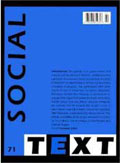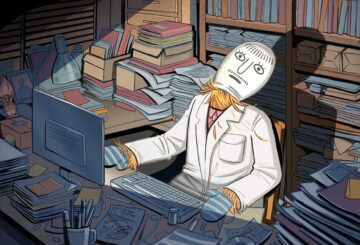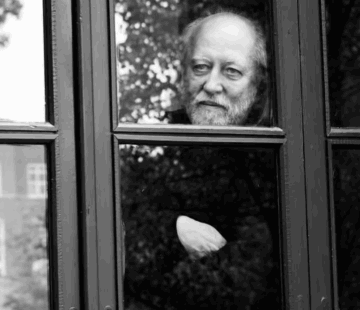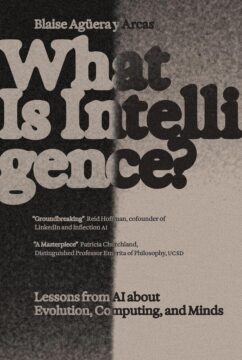Enjoying the content on 3QD? Help keep us going by donating now.
Category: Recommended Reading
Nick Cave on How to Use Your Suffering
Maria Popova at The Marginalian:
 How you love, how you give, and how you suffer is just about the sum of who you are. What you make of your suffering is the abacus on which it all adds up. It is there that your capacities to love and to give contract or expand, there that you feel most alone, there that you touch most directly the thread of human experience that binds us. Suffering is the common record of our unreturned messages to hope, and because we are the hoping species, it is inseparable from what makes us human. More than a cerebral operation, it is an experience of the total organism, entwining synapse and sinew, engaging the entire orchestra of hormones and neurotransmitters and enzymes that plays the symphony of aliveness. This is why AIs — those disembodied cerebrators — will never know suffering and, not knowing the transmutation of suffering into meaning we call art, will never be able to write a truly great poem. (About suffering they will always be wrong, the new masters.)
How you love, how you give, and how you suffer is just about the sum of who you are. What you make of your suffering is the abacus on which it all adds up. It is there that your capacities to love and to give contract or expand, there that you feel most alone, there that you touch most directly the thread of human experience that binds us. Suffering is the common record of our unreturned messages to hope, and because we are the hoping species, it is inseparable from what makes us human. More than a cerebral operation, it is an experience of the total organism, entwining synapse and sinew, engaging the entire orchestra of hormones and neurotransmitters and enzymes that plays the symphony of aliveness. This is why AIs — those disembodied cerebrators — will never know suffering and, not knowing the transmutation of suffering into meaning we call art, will never be able to write a truly great poem. (About suffering they will always be wrong, the new masters.)
Nick Cave — who has known more grief than most, having lost his young son and lost his own father at a young age, but has remained an unrelenting guardian of joy — takes up the question of that transmutation on the pages of his altogether magnificent book Faith, Hope and Carnage (public library).
more here.
Enjoying the content on 3QD? Help keep us going by donating now.
A Eulogy For the White House’s East Wing
Philip Elliott in Time Magazine:
 First came the gilding of the Oval Office. Then came the flagpoles, both massive. Then the stone tile and food-court umbrellas over the Rose Garden. And then gold accents joined the Cabinet Room. And the art got swapped out, even putting Barack Obama and George W. Bush out of public view. The tile in the Lincoln Bedroom’s bathroom got exchanged for marble. The same happened with the breezeway leading into the Rose Garden. And the West Colonnade got its own upgrade, complete with an insult for former President Joe Biden.
First came the gilding of the Oval Office. Then came the flagpoles, both massive. Then the stone tile and food-court umbrellas over the Rose Garden. And then gold accents joined the Cabinet Room. And the art got swapped out, even putting Barack Obama and George W. Bush out of public view. The tile in the Lincoln Bedroom’s bathroom got exchanged for marble. The same happened with the breezeway leading into the Rose Garden. And the West Colonnade got its own upgrade, complete with an insult for former President Joe Biden.
And now come the bulldozers, the water cannons, and the construction walls to block views of the massive demolition of the White House’s East Wing, the latest manifestation of President Donald Trump’s effort to leave his mark on one of America’s most iconic buildings. By the weekend, the East Wing will be rubble, the latest D.C. institution to be smashed by Trumpism. Since 1942, when a second floor was added to the East Wing, it has been one of the most traveled parts of the world-famous White House campus. Almost all visitors came through it. Whereas the West Wing was a hard political space, the East Wing was a softer, apolitical space. It had Jacky O’s gardens and a family movie theater down the hall. For most state dinners, the hall there was the photo-op red carpet.
More here.
Enjoying the content on 3QD? Help keep us going by donating now.
Thursday Poem
Not About Anyone’s Hands
This poem is not about anyone’s hands
holding a book or a steering wheel or winding a clock
or steady as the dark beyond my headlights.
Trees sweep past. Houses are bulk and shadow
except for a light that shows where the kitchen is. People asleep
don’t hear sorrows piling, cumulous, behind the rotting barn.
Even the air has nothing in it. This poem is not
about neighbors, or what it means to stop at a house
because all the lights are on and that means someone’s sick.
Some people driving home know just what’s in the dark:
dogs, coyotes, cows that shift against other cow legs and rumps,
tails winding down like broken metronomes
|until even the horses are dreaming, uninterrupted green.
In this poem, the wife’s hands let go of everything. Autumn glides by
outside the frost-starred, shatter-starred windshield glass.
The driveway’s long. The husband stands, watching the stars
fall doubled into the pond. He doesn’t say anything.
He doesn’t see what her arms will carry. The dogs howl.
Some things are nobody’s fault. Get the broom out.
Think of it as a waltz, dance with it, and sweep.
JoLee G. Passerini
—from Rattle #26, Winter 2006
Enjoying the content on 3QD? Help keep us going by donating now.
How Does Sugar Affect Our Oral Microbiome and Teeth?
Shelby Bradford in The Scientist:
 As Halloween and other indulgent holidays come up on the calendars, people are likely to enjoy more sweet treats. But it won’t only be the individual enjoying that extra rush of sugar; the bacteria that call the human mouth home will also be responding to the additional candies and confectionary creations. So how does the oral microbiome respond to sugar?
As Halloween and other indulgent holidays come up on the calendars, people are likely to enjoy more sweet treats. But it won’t only be the individual enjoying that extra rush of sugar; the bacteria that call the human mouth home will also be responding to the additional candies and confectionary creations. So how does the oral microbiome respond to sugar?
“In the most worst possible ways,” answered Purnima Kumar, a clinician scientist and periodontist who studies the oral microbiome at University of Michigan. Kumar described a healthy, oral microbiome as a community that uses oxygen for its energy production. “Because it’s energy efficient it does not produce a lot of toxins or metabolic byproducts,” she said. “That’s what our immune system recognizes as health compatible and therefore literally lives in harmony with it or tolerates it.” In addition to regular brushing and flossing, Kumar said that diet has a large influence on the microbiome. Less processed foods, especially those high in fiber, are often less sticky, which decreases bacteria’s ability to adhere and overgrow at a surface.
More here.
Enjoying the content on 3QD? Help keep us going by donating now.
A Biography Of Poet James Schuyler
Hannah Zeavin at Bookforum:
 A MAN LOOKS OVER A FENCE, SPYING. He notes the arrival of a Buick hardtop convertible. Parked now, the driver rolls the top down, using a new automatic mechanism, exposing the interior leather to the elements right at the wrong moment. The camera at first shows a magnificent three, who spill out as from a clown car: Jane Freilicher, Frank O’Hara, and John Ashbery. Then it lands on Jimmy Schuyler in the back, who, doubling as a porter, carries the luggage.
A MAN LOOKS OVER A FENCE, SPYING. He notes the arrival of a Buick hardtop convertible. Parked now, the driver rolls the top down, using a new automatic mechanism, exposing the interior leather to the elements right at the wrong moment. The camera at first shows a magnificent three, who spill out as from a clown car: Jane Freilicher, Frank O’Hara, and John Ashbery. Then it lands on Jimmy Schuyler in the back, who, doubling as a porter, carries the luggage.
So begins Presenting Jane (1952), a short film made by Harrison Starr and John Latouche. The boy poets and their beloved woman painter have taken to Long Island; it is summer, and this exurb is, or would become, their haunt. It’s afternoon and time to get down to the water. John presses his palm against the supporting column of the porch, while Frank holds his column more tentatively and tenderly. They stare out on the sound, gazing at Jane, now in the landscape she prefers to paint. A glitch occurs, and like a ghost conjured through splice, Jimmy appears behind them once again.
more here.
Enjoying the content on 3QD? Help keep us going by donating now.
Wednesday, October 22, 2025
Sam Sussman with Ayad Akhtar: Boy from the North Country
Enjoying the content on 3QD? Help keep us going by donating now.
On the Simple Life of Ludwig Wittgenstein
Anthony Gottlieb at Lit Hub:
 In 1931, at the age of forty-one, Ludwig Wittgenstein mused in his diary that perhaps his name would live on only as the end point of Western philosophy—“like the name of the one who burnt down the library of Alexandria.” There probably was no such an arsonist. The books of ancient Alexandria seem to have perished mainly by rot and neglect, not in a single blaze.
In 1931, at the age of forty-one, Ludwig Wittgenstein mused in his diary that perhaps his name would live on only as the end point of Western philosophy—“like the name of the one who burnt down the library of Alexandria.” There probably was no such an arsonist. The books of ancient Alexandria seem to have perished mainly by rot and neglect, not in a single blaze.
And Western philosophy certainly did not come to an end with Wittgenstein, who died in 1951. He did not really believe that it would. Wittgenstein could get carried away when writing in his diaries, especially when contemplating himself, which he did often.
But he did think that he had found a fresh approach to philosophical problems. At least for a while and in some places, his influence changed how philosophy was done.
more here.
Enjoying the content on 3QD? Help keep us going by donating now.
Thirty Years After The Sokal Affair
Bruce Robbins at The Baffler:
 Social Text still exists. In the spring of 1996, when the journal was the object of an enthusiastically publicized hoax by the physicist Alan Sokal, its survival seemed a bad bet. You published an essay arguing that gravity is a “social and linguistic construct?” Really? The mainstream media, hitherto unaware of the existence of this very little, very marginal magazine, were uncertain what exactly they were mocking. Was Social Text’s foolishness postmodern? Left wing? Cultural? Academic? They were certain, however, that what they smelled in the water was blood. On their side, and for a not insignificant portion of the left, jubilation. On the other side, humiliation. (I should know: I was the journal’s coeditor at the time.) We seemed like the stupidest people in the world, or the stupidest people who had been pretending to speak on behalf of the most avant-garde sociopolitical views. One friend of the journal suggested that we fall on our swords. If we owned no swords, swords could be made available.
Social Text still exists. In the spring of 1996, when the journal was the object of an enthusiastically publicized hoax by the physicist Alan Sokal, its survival seemed a bad bet. You published an essay arguing that gravity is a “social and linguistic construct?” Really? The mainstream media, hitherto unaware of the existence of this very little, very marginal magazine, were uncertain what exactly they were mocking. Was Social Text’s foolishness postmodern? Left wing? Cultural? Academic? They were certain, however, that what they smelled in the water was blood. On their side, and for a not insignificant portion of the left, jubilation. On the other side, humiliation. (I should know: I was the journal’s coeditor at the time.) We seemed like the stupidest people in the world, or the stupidest people who had been pretending to speak on behalf of the most avant-garde sociopolitical views. One friend of the journal suggested that we fall on our swords. If we owned no swords, swords could be made available.
The journal did not fold. One reason was that it had published a lot of good work, none of it remotely resembling Sokal’s gravity-is-a-construct nonsense, and those who cared about such things knew it.
more here.
Enjoying the content on 3QD? Help keep us going by donating now.
An Opinionated Guide to Using AI Right Now
Ethan Mollick at One Useful Thing:
 The four most advanced AI systems are Claude from Anthropic, Google’s Gemini, OpenAI’s ChatGPT, and Grok by Elon Musk’s xAI. Then there are the open weights AI families, which are almost (but not quite) as good: Deepseek, Kimi, Z and Qwen from China, and Mistral from France. Together, variations on these AI models take up the first 35 spots in almost any rating system of AI. Any other AI service you use that offers a cutting-edge AI from Microsoft Copilot to Perplexity (both of which offer some free use) is powered by one or more of these nine AIs as its base.
The four most advanced AI systems are Claude from Anthropic, Google’s Gemini, OpenAI’s ChatGPT, and Grok by Elon Musk’s xAI. Then there are the open weights AI families, which are almost (but not quite) as good: Deepseek, Kimi, Z and Qwen from China, and Mistral from France. Together, variations on these AI models take up the first 35 spots in almost any rating system of AI. Any other AI service you use that offers a cutting-edge AI from Microsoft Copilot to Perplexity (both of which offer some free use) is powered by one or more of these nine AIs as its base.
How should you pick among them? Some free systems (like Gemini and Perplexity) do a good job with web search, while others cannot search the web at all. If you want free image creation, the best option is Gemini, with ChatGPT and Grok as runners-up. But, ultimately, these AIs differ in many small ways, including privacy policies, levels of access, capabilities, the approach they take to ethical issues, and “personality.” And all of these things fluctuate over time. So pick a model you like based on these factors and use it. However, if you are considering potentially upgrading to a paid account, I would suggest starting with the free accounts from Anthropic, Google, or OpenAI.
More here.
Enjoying the content on 3QD? Help keep us going by donating now.
Winning Images From the 2025 Wildlife Photographer of the Year Awards

More here.
Enjoying the content on 3QD? Help keep us going by donating now.
Ship anchors don’t work the way you think
Enjoying the content on 3QD? Help keep us going by donating now.
William Dalrymple on Gaza’s rich history in ruins
William Dalrymple in The Guardian:
 As a ceasefire brings a measure of peace to the Dresden-like hellscape that Gaza has become, it is time to take stock of all that has been lost. The human cost of what the UN commission of inquiry recognises as a genocide is of course incalculable, but fewer are aware of how much rich history and archaeology has also been destroyed in these horrific months. This is bolstered by the widespread assumption that Gaza was little more than a huge refugee camp built on a recently settled portion of desert. That is quite wrong. In reality Gaza it is one of the oldest urban centres on the planet.
As a ceasefire brings a measure of peace to the Dresden-like hellscape that Gaza has become, it is time to take stock of all that has been lost. The human cost of what the UN commission of inquiry recognises as a genocide is of course incalculable, but fewer are aware of how much rich history and archaeology has also been destroyed in these horrific months. This is bolstered by the widespread assumption that Gaza was little more than a huge refugee camp built on a recently settled portion of desert. That is quite wrong. In reality Gaza it is one of the oldest urban centres on the planet.
Golda Meir famously declared that “there was no such thing as Palestinians”, but the reality is very different. Palestine is actually one of humanity’s oldest toponyms, and records of a people named after it are as old as literacy itself. Palestine was an established name for the coast between Egypt and Phoenicia since at least the second millennium BCE: the ancient Egyptian texts refer to “Peleset” from about 1450BCE, Assyrians inscriptions to the “Palashtu” c800BCE, and Herodotus c480BCE to “Παλαιστίνη” (Palaistinē). This was all brought home to me as I worked, with my co-presenter Anita Anand, on a 12-part series on Gaza’s history for the Empire podcast.
More here.
Enjoying the content on 3QD? Help keep us going by donating now.
Sen. Bernie Sanders – Harnessing Energy From “No Kings” Rally to “Fight Oligarchy”
Enjoying the content on 3QD? Help keep us going by donating now.
How to spot fake scientists and stop them from publishing papers
Miryam Naddaf in Nature:
 Beatriz Ychussie’s career in mathematics seemed to be going really well. She worked at Roskilde University in Denmark where, in 2015 and 2016 alone, she published four papers on mathematical formulae for quantum particles, heat flow and geometry, and reviewed multiple manuscripts for reputable journals. But a few years later, her run of promising studies dried up. An investigation by the publisher of three of those papers found not only that the work was flawed, but that Ychussie didn’t even exist.
Beatriz Ychussie’s career in mathematics seemed to be going really well. She worked at Roskilde University in Denmark where, in 2015 and 2016 alone, she published four papers on mathematical formulae for quantum particles, heat flow and geometry, and reviewed multiple manuscripts for reputable journals. But a few years later, her run of promising studies dried up. An investigation by the publisher of three of those papers found not only that the work was flawed, but that Ychussie didn’t even exist.
Her name is one of a network of 26 fictitious authors and reviewers that had infiltrated four mathematics journals belonging to the London-based publisher Springer Nature. These sham scholars were created by a paper mill, a company that manipulates peer reviews and sells fake research papers to researchers looking to boost their profile. By inventing a stable of fake scientists, paper mills can create a ready supply of publications and favourable peer reviews, ensuring that more of the mills’ submissions get published. This tactic increases their output and credibility for paying customers.
More here.
Enjoying the content on 3QD? Help keep us going by donating now.
Wednesday Poem
Moondrunk on Diwali
Mayi, I’m fine—it’s just that my mind, the little accountant
on the top floor, has surrendered sense. All he is left with now
is a sparkler behind the ribs, some electricity finding home.
Here—take his black pen, his red squiggles, light lines. At noon,
every one learns the way of light; every sum bathes in the shape
of sound. And here I rinse the rice and the living room rinses me
in air; the water drinks the moon, then clears. No one counts
color, yet color traverses everything—intoxicated—
even the ladle cradles a raw verse. Whatever goddess tends
night and gold, I just keep these lines of rice lamps,
hundreds of I’s and ones drying in a cup, without even a wobble.
If I wobble, it’s the song of rice, not wine; my bowl practices
the smallest poetry: I be, I be. Call it lightful, call it moonless,
call it non-sense, call it key—Mayi, this unlocked rice rooms me.
by Shivpreet Singh
—from Poets Respond
Enjoying the content on 3QD? Help keep us going by donating now.
Tuesday, October 21, 2025
Colm Tóibín: Why I set up a press to publish Nobel winner László Krasznahorkai
Colm Tóibín in The Guardian:
 That Christmas – it was almost 20 years ago – I came back from America with news. My friend Daniel Medin had recommended two books to me, both by the Hungarian novelist László Krasznahorkai, one called War and War and the other The Melancholy of Resistance. We had also watched some Béla Tarr films, whose screenplays had been written by Krasznahorkai. The sense of slow, seething menace in the film Werckmeister Harmonies, based on The Melancholy of Resistance, and the lack of easy psychology and obvious motive in the film, the camera moving like a cat, made it exciting, but not as exciting as the two novels.
That Christmas – it was almost 20 years ago – I came back from America with news. My friend Daniel Medin had recommended two books to me, both by the Hungarian novelist László Krasznahorkai, one called War and War and the other The Melancholy of Resistance. We had also watched some Béla Tarr films, whose screenplays had been written by Krasznahorkai. The sense of slow, seething menace in the film Werckmeister Harmonies, based on The Melancholy of Resistance, and the lack of easy psychology and obvious motive in the film, the camera moving like a cat, made it exciting, but not as exciting as the two novels.
Krasznahorkai, I noticed, loved the snaking sentence, the high-wire act, mild panic steering towards a shivering fear felt by his characters, followed, in clause after clause, by fitful realisations and further reasons for gloom or alarm, and then, with just a comma in between, ironic (and even comic) responses to what comes next into the mind. These extraordinary sentences had been translated by the poet George Szirtes with considerable rhythmic energy.
More here.
Enjoying the content on 3QD? Help keep us going by donating now.
What Isn’t Intelligence?
Patrick House at the Los Angeles Review of Books:
 The trajectory of intelligent life on this planet can be described as an evolution of its verbs: to move, to reproduce, to hunt, to hide, to feel, to make, to use, to think. With the recent rise of artificial intelligence and competent chatbots, many experts have volubly opined about which verbs matter for what counts as “intelligence.” But like artificial insemination, artificial hearts, and artificial reefs, artificial intelligence was designed to interface with biology; its abilities and purpose are inferred exclusively from this interaction.
The trajectory of intelligent life on this planet can be described as an evolution of its verbs: to move, to reproduce, to hunt, to hide, to feel, to make, to use, to think. With the recent rise of artificial intelligence and competent chatbots, many experts have volubly opined about which verbs matter for what counts as “intelligence.” But like artificial insemination, artificial hearts, and artificial reefs, artificial intelligence was designed to interface with biology; its abilities and purpose are inferred exclusively from this interaction.
Nonetheless, there are cogent arguments that humanity has birthed, inside the world’s computer data centers and built on or alongside large language models, a computational process that skipped having to move, reproduce, hunt, hide, or feel and went straight to intelligence. Is this true?
The computer engineer Blaise Agüera y Arcas believes so. Sort of. It depends on how you define “intelligence.” In his new book What Is Intelligence? Lessons from AI About Evolution, Computing, and Minds, Agüera y Arcas toes the line between naturalist and computer scientist, and with broad genius and rare humility answers in the affirmative: our computers are indeed intelligent. Not because of what they are, but because of what they do.
More here.
Enjoying the content on 3QD? Help keep us going by donating now.
Social engineering, malware, and the future of cybersecurity in AI: Part 2
Part 1 can be seen here.
Enjoying the content on 3QD? Help keep us going by donating now.
Why is there so little money in politics?
Scott Alexander at Astral Codex Ten:
 During the 2018 election, Americans – candidates, parties, PACs, and small donors like you – spent a combined $5 billion pushing their preferred candidates. Although that sounds like a lot of money, Americans spent $12 billion on almonds that same year. Why the imbalance? The oil industry has strong political opinions, and they make $500 billion per year. Do they really think electing oil-friendly politicians isn’t worth 2% of revenue?
During the 2018 election, Americans – candidates, parties, PACs, and small donors like you – spent a combined $5 billion pushing their preferred candidates. Although that sounds like a lot of money, Americans spent $12 billion on almonds that same year. Why the imbalance? The oil industry has strong political opinions, and they make $500 billion per year. Do they really think electing oil-friendly politicians isn’t worth 2% of revenue?
We debated how this could be. Some of the discussion proved prescient – I asked if maybe Elon Musk should buy some kind of social media property. But we never found a good answer, and the implied question remained open: if some billionaire wanted to spend an actually relevant percent of his net worth on politics, could he just take over everything?
I recently talked to some Silicon Valley political consultants who updated me on the status of this issue: Marc Andreessen tried this in 2024 and it basically worked. Now he is trying it a second time, it will probably work again, and Marc Andreessen will probably own every politician twice over.
More here.
Enjoying the content on 3QD? Help keep us going by donating now.
